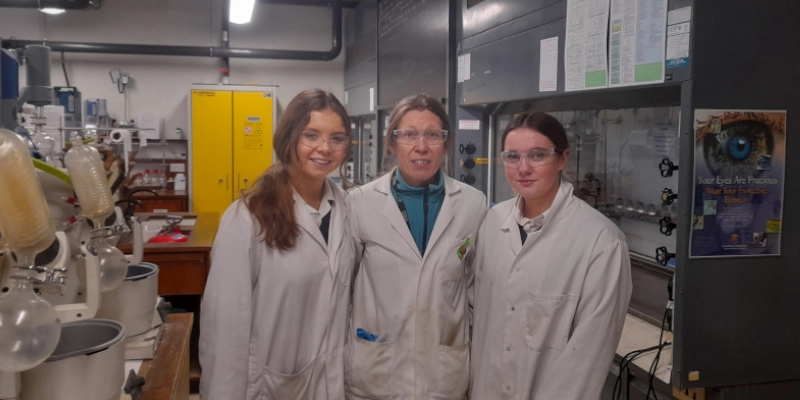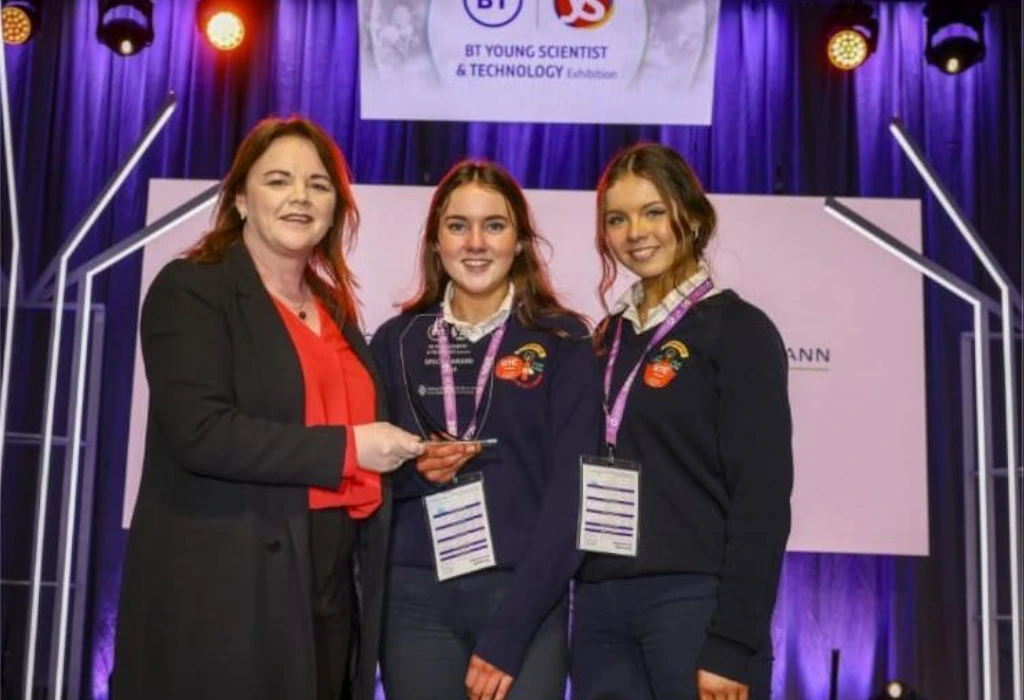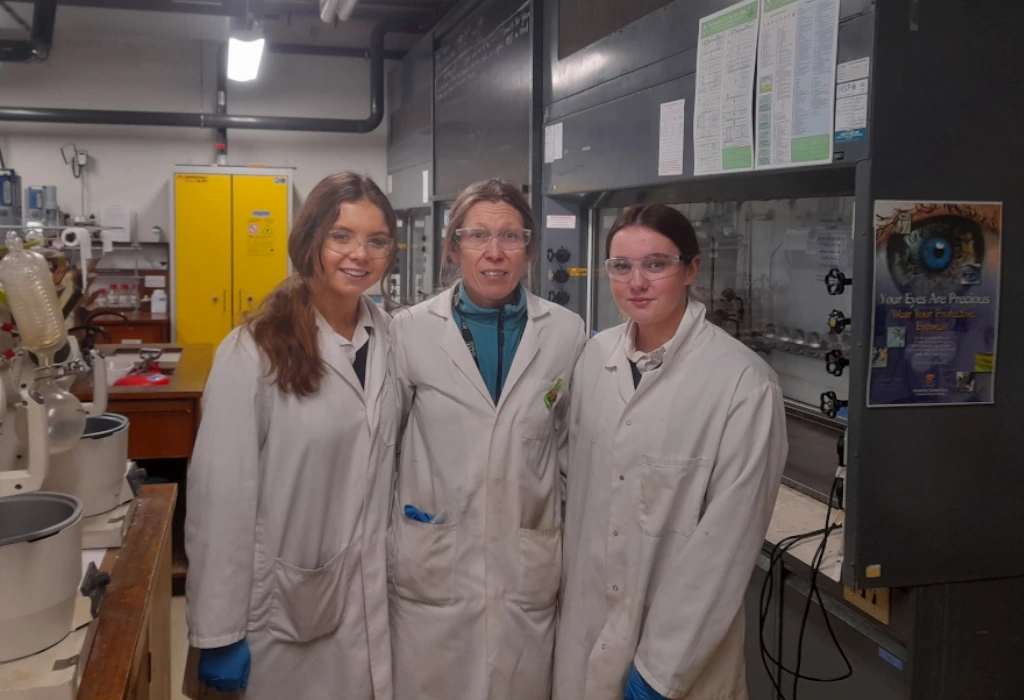Inspiring the Next Generation of Researchers: Dr Anna Hogan

Through her dedication to mentoring young students, Dr Anna Hogan exemplifies the powerful impact academics can have in inspiring the next generation of scientists. By sharing her passion and expertise, she helps students, particularly young women, see a place for themselves in science.
At University College Cork, Dr Hogan provides essential technical support and training for the undergraduate, postgraduate and research programs in analytical chemistry. Each academic year, she works with over 300 students. Her responsibilities include preparing all materials and equipment necessary for practical sessions, as well as assisting academic staff and students with their experiments when analytical techniques are used. She is also actively involved in master projects, workshops and designing new laboratory practicals.
Dr Hogan’s interest in science began at a young age, driven by a natural curiosity about how things work. As a child, she especially enjoyed learning by observation and hands-on experimentation. She can still remember the excitement of receiving her acceptance letter to study chemistry at a Higher Level of Education. Now, she strives to pass that enthusiasm on to others, for example by supporting young people in developing their laboratory skills.
 Photo: Miriam Finn (L) and Kate McEvoy (R) receiving the FSAI award at the 2024 BT Young Scientist Competition held in Dublin. Recently, Dr Hogan mentored secondary school students Miriam Finn and Kate McEvoy from St Mary’s High School, Midleton, on a project that went on to win the Food Safety Authority of Ireland (FSAI) award at the 2024 BT Young Scientist Exhibition. She found the girls to be naturally curious and focused on problem-solving, which in turn motivated her.
Photo: Miriam Finn (L) and Kate McEvoy (R) receiving the FSAI award at the 2024 BT Young Scientist Competition held in Dublin. Recently, Dr Hogan mentored secondary school students Miriam Finn and Kate McEvoy from St Mary’s High School, Midleton, on a project that went on to win the Food Safety Authority of Ireland (FSAI) award at the 2024 BT Young Scientist Exhibition. She found the girls to be naturally curious and focused on problem-solving, which in turn motivated her.
The girls subsequently went on to win second place in the Merck Secondary School’s Science Competition 2024. Dr Hogan takes great satisfaction in seeing these students succeed and witnessing their achievements being celebrated by their school, peers, teachers, and parents. Miriam and Kate have plans to return to UCC to pursue STEM (Science, Technology, Engineering, and Mathematics) careers, an outcome Dr Hogan considers a dream come true. As she puts it:
"Who knows, we might have just inspired the next woman to win a Nobel Prize."
In Dr Hogan’s opinion, UCC researchers have a vital role to play in inspiring young people — especially girls — to engage with STEM, and in helping them put their ideas into practice. Since some secondary teachers may not have the time or resources to guide students through research projects, researchers could step in to help.
She explains, "Many girls have no experience of professional lab work. By bringing them to UCC, they have the opportunity to interact with staff and visualise a future for themselves in the science.”
 Photo: Dr Anna Hogan with Miriam Finn (L) and Kate McEvoy (R) in the UCC Chemistry Laboratory conducting experiments for their BT Young Science 2024 award-winning project entitled: ‘How Healthy are Air Fryers’
Photo: Dr Anna Hogan with Miriam Finn (L) and Kate McEvoy (R) in the UCC Chemistry Laboratory conducting experiments for their BT Young Science 2024 award-winning project entitled: ‘How Healthy are Air Fryers’
Through mentoring, Dr Hogan hopes to help students grow in confidence and set higher expectations for themselves. Furthermore, she advocates for providing students opportunities to explore university courses, view facilities, and experience laboratory spaces firsthand.
She also stresses the importance of female representation in STEM, as seeing and interacting with successful women in science can inspire young women to envision themselves in similar careers. Reflecting on her own experience, Dr Hogan notes that her secondary school was named after Maria Sklodowska-Curie—an extraordinary Polish scientist who has inspired generations of women.
Dr Hogan also emphasises the critical role parents play in shaping their daughter’s interests in science, by encouraging questions, curiosity and experimentation. She fondly recalls how her parents provided her with the freedom to explore how things work, understand their functions, and even engage in conversations about fixing and repairing things at home. Home can be a safe space where young girls receive the encouragement and inspiration they need to develop a passion for science subjects.
Dr Hogan firmly believes that we need more women in science subjects to bring different perspectives to research and conversation. It's all about balance, making sure that there is an opportunity given to everybody who is working on a project that contributes to a peaceful and prosperous world.
Looking ahead, Dr Hogan is excited to continue mentoring students in similar projects. As she puts it:
“It is my best investment in the future, spending time with young people to support their work, and inspiring them to make a positive contribution to our lives.”
UCC Research Staff Association
Contact us
C/O Hydraulics and Maritime Research Centre, Pouladuff Rd, Togher (UCC Internal)
